Mercatorio offers a wide variety of ways to build a profitable enterprise, be it based on vertically integrated or highly specialized production, trade or shipping. All this choice can be daunting when setting out, so this post will go through the steps of getting a basic income stream set up when starting out without getting tangled up in risky endeavors.
The start
Every player starts out with a storehouse with some construction materials.

 Some stacks of timber in storage. The cashflow is negative due to property taxes,
Some stacks of timber in storage. The cashflow is negative due to property taxes, but as we start out under the protection of the church we don't have to worry about that yet.
We can see we have a spare worker (in the orange box), clicking the box reveals that it's us, the head of the household.
 That's us, the head of household, starting out as a novice in all skill classes. What is of immediate value for us here is the 25 free workdays we can put towards construction or production.
That's us, the head of household, starting out as a novice in all skill classes. What is of immediate value for us here is the 25 free workdays we can put towards construction or production.Finding work
Already at the outset of the game it's possible to assign the head of household to perform duties for the town, like providing protection with knight duty. This can be lucrative, and is an option to consider, either at the start or if in need of some extra cash later on. However, we're here to build a business empire, and for that we need buildings that produce stuff. And not just any stuff, stuff that makes a profit.
Production methods
Production is done with production methods, and there's a handy list of them in the menu found at the top of the screen.
There are a lot of production methods in Mercatorio, so to narrow down our search we'll apply some filters. The top ones are to filter out unprofitable and impossible (in our town) production methods, and we want to consider only the simple production methods right now, as they are quicker to get going and have fewer dependencies, and due to dealing with more basic products, they will usually be less volatile and risky.
 We're looking for something profitable we have the skills to do. We will also only consider simple production methods for now (see the bottom of this article for why we choose to avoid more advanced ones)
We're looking for something profitable we have the skills to do. We will also only consider simple production methods for now (see the bottom of this article for why we choose to avoid more advanced ones) Since cashflow is as important as profits for us, we toggle the labour source to household labour, which has no monetary cost. There are several good options, including the aforementioned knight duty. We decide to take a closer look at shear sheep 1.
Since cashflow is as important as profits for us, we toggle the labour source to household labour, which has no monetary cost. There are several good options, including the aforementioned knight duty. We decide to take a closer look at shear sheep 1.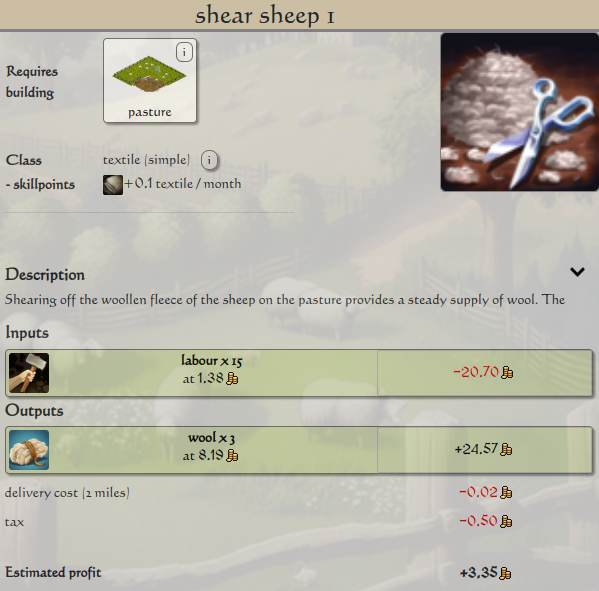 Profit margin looks ok, especially if we bring our own labour.
Profit margin looks ok, especially if we bring our own labour.
Simple production methods have few inputs and are usually quite straightforward to read, and wool being a basic product should be relatively safe to get into. However, it's always worth considering if 1) the current price can be expected to stay, and 2) can the market absorb the new supply we're bringing.
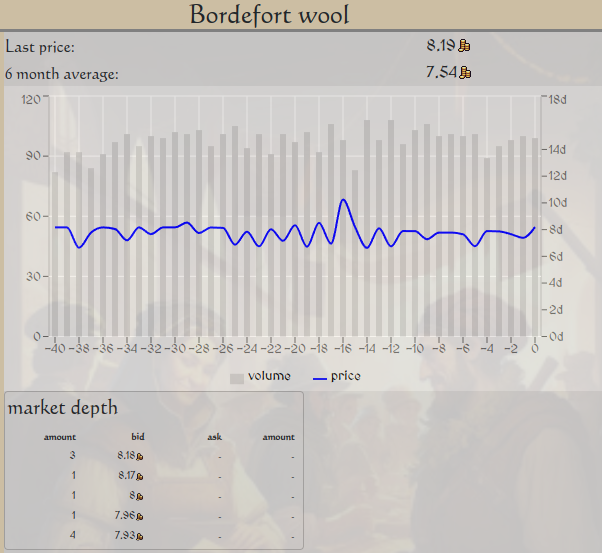 Clicking in on wool and looking at its market, it seems that the price is relatively stable and it's a deep / high volume market. Adding 3 more units of supply is unlikely to crash this.
Clicking in on wool and looking at its market, it seems that the price is relatively stable and it's a deep / high volume market. Adding 3 more units of supply is unlikely to crash this.
Most buildings support a variety of production methods, sometimes with added requirements of certain upgrades. Having the option to pivot into producing something else or progressing to more advanced production methods can be useful later.
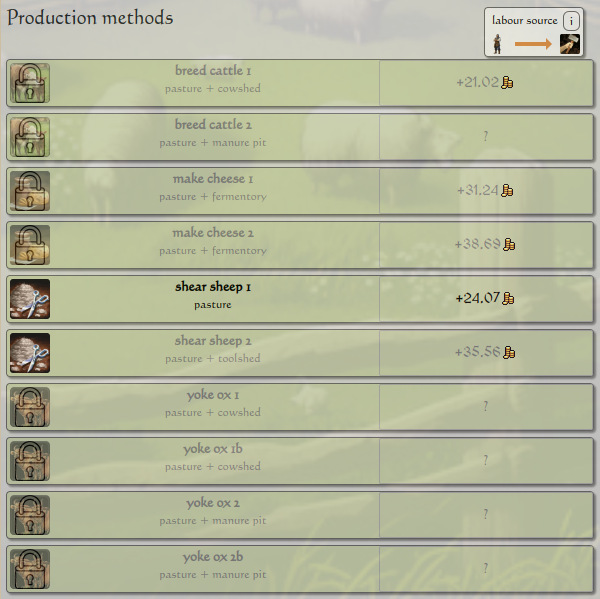 Many are locked due to skill requirements for now, but that's solvable, also there is a plain upgrade of shear sheep that only requires a toolshed upgrade.
Many are locked due to skill requirements for now, but that's solvable, also there is a plain upgrade of shear sheep that only requires a toolshed upgrade.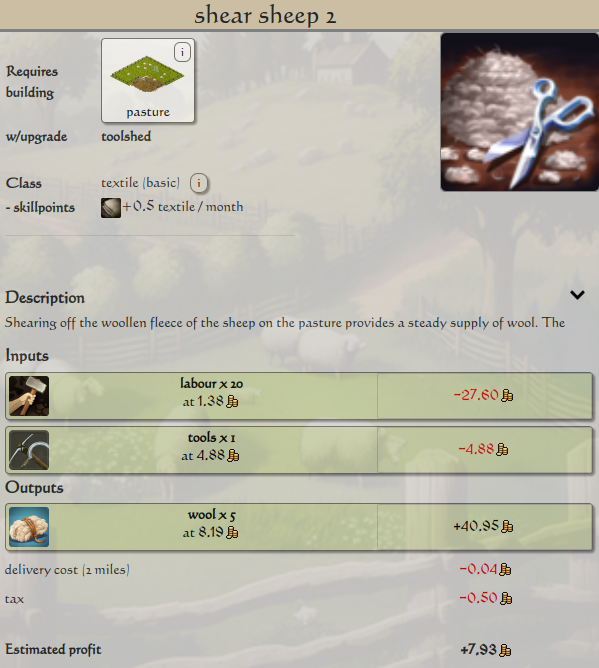 Shear sheep 2 is a basic production method, meaning we don't need to upgrade any skills to access it. Profit margin looks good, we just need to secure some tools. But first things first…
Shear sheep 2 is a basic production method, meaning we don't need to upgrade any skills to access it. Profit margin looks good, we just need to secure some tools. But first things first…Construction
Having decided to build a pasture, we need to find a suitable place for it. Being close to the town center is good for keeping delivery costs down, although wool is light and easy to transport, so this is less of a concern for us. Some space to expand the pasture is useful, as expansion is cheaper than building from scratch, re-uses upgrades and doesn't require additional building slots.
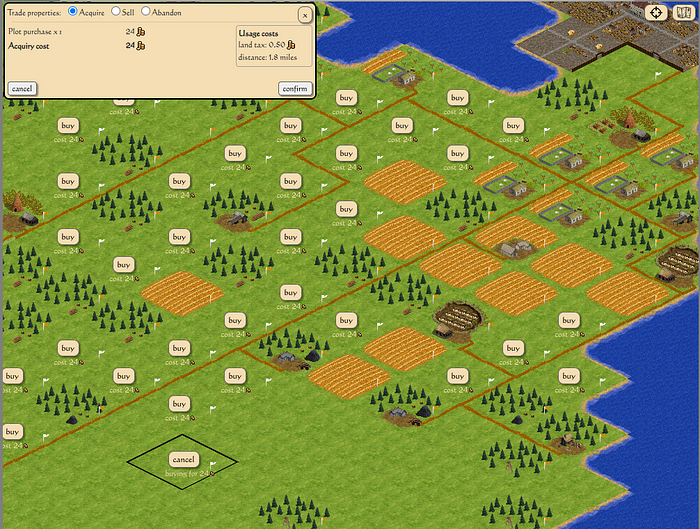 We start by acquiring some land to build on. We can either buy land from the town or other players, or claim new land that expands the town boundaries. There are costs associated with both, and especially large town expansions can be expensive, another reason to stay near the town.
We start by acquiring some land to build on. We can either buy land from the town or other players, or claim new land that expands the town boundaries. There are costs associated with both, and especially large town expansions can be expensive, another reason to stay near the town.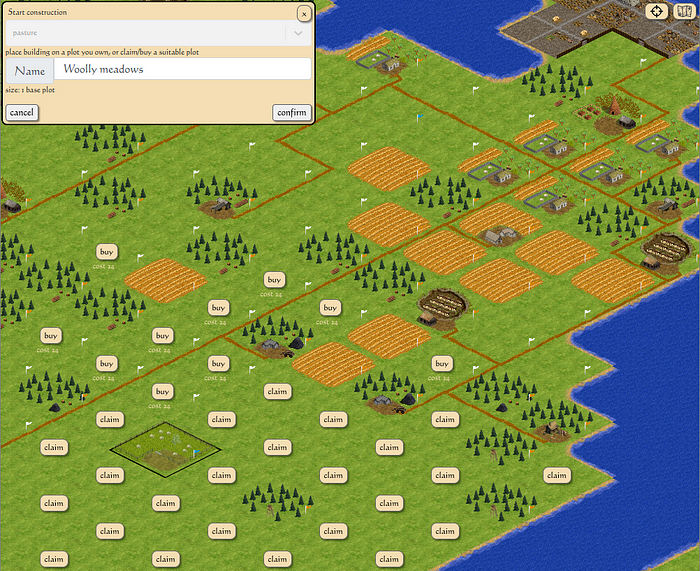 Once we got a plot, we can place our pasture. There's room for expansion around it and if we're sure we want to expand soon, we can already buy up more land to secure it.
Once we got a plot, we can place our pasture. There's room for expansion around it and if we're sure we want to expand soon, we can already buy up more land to secure it. Construction begins. The nominal construction time is 6 turns (at one hour each), while the default medium pace has set up automatic purchasing that will stretch it to 12 turns to reduce the price impact. If we allot a budget and leave the defaults, the pasture should complete on its own in 12 turns (tip: register your player on the discord server and enable notifications to be notified when construction completes)
Construction begins. The nominal construction time is 6 turns (at one hour each), while the default medium pace has set up automatic purchasing that will stretch it to 12 turns to reduce the price impact. If we allot a budget and leave the defaults, the pasture should complete on its own in 12 turns (tip: register your player on the discord server and enable notifications to be notified when construction completes)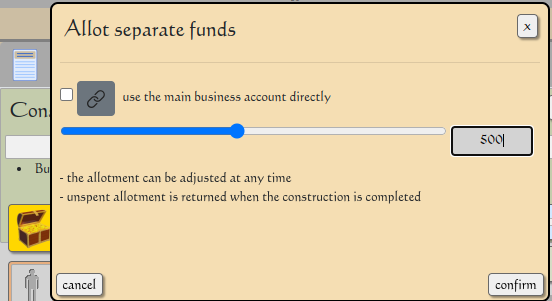
The construction process requires some time to pass and some construction materials to be delivered to the site, and there are a few ways to go about this. We can assign our worker to provide free labour or transfer materials from the storehouse. Or we can link the construction project with the storehouse (acting as a small warehouse here), to automatically use resources we have there or that we produce with other linked buildings.
Rushing construction
We want to use our own timber and if possible get the construction finished sooner. At the start of the game we even have the ability to rush construction projects in less than the nominal construction time. We still need to obtain the materials though.
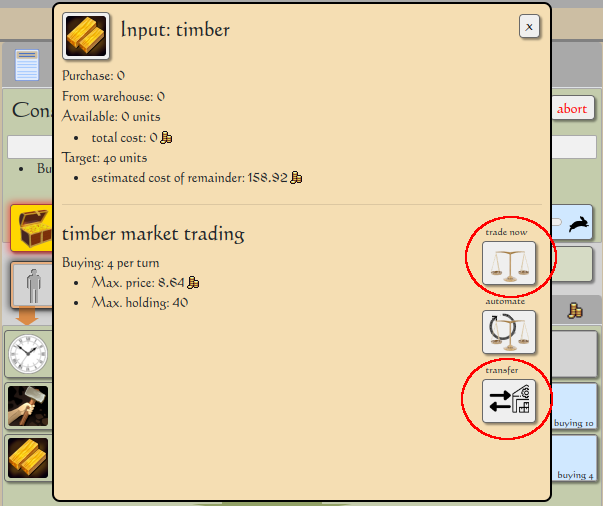
We will start by transferring over the 25 timber from our storehouse, then take a look at the timber market.
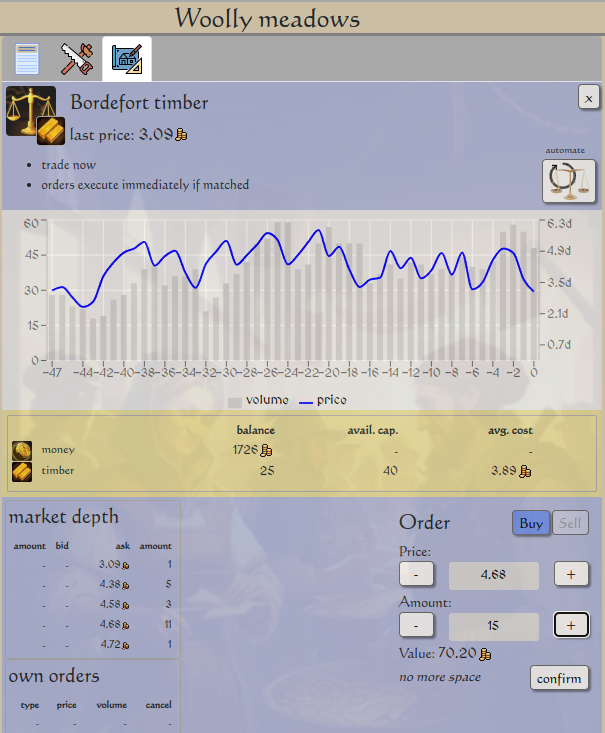 This time we're not looking as much at historical price and volume as the immediately available supply from the pending asks under market depth. We're able to get the 15 timbers we need for just over 70 pence. If this wasn't available, we could set up automatic buying to acquire it over a few turns instead.
This time we're not looking as much at historical price and volume as the immediately available supply from the pending asks under market depth. We're able to get the 15 timbers we need for just over 70 pence. If this wasn't available, we could set up automatic buying to acquire it over a few turns instead.Construction can be resource intensive and can easily absorb all free supply and drive prices through the roof if we're not careful, resulting in much more expensive buildings. We should always pay attention to this and potentially slow down purchasing to avoid market shocks. Especially for basic products like timber we can also consider building a logging camp to obtain our own supply. In this case though, there is enough market depth both of timber and labour that we can immediately secure the required materials at a reasonable price.
 With the materials secured, the rush option becomes available and we can immediately complete the construction by using one of our 3 rush points.
With the materials secured, the rush option becomes available and we can immediately complete the construction by using one of our 3 rush points.Production
With the pasture complete, we can move to the production screen and select our production method. Again, we have to fund the production, and we have to set a production target (how fast we want to run it). If we're worried about the market impact of either securing the inputs or selling the outputs, we might want to start at less than 100% capacity. In our case, using our own labour and selling into the deep wool market, this is not a concern.
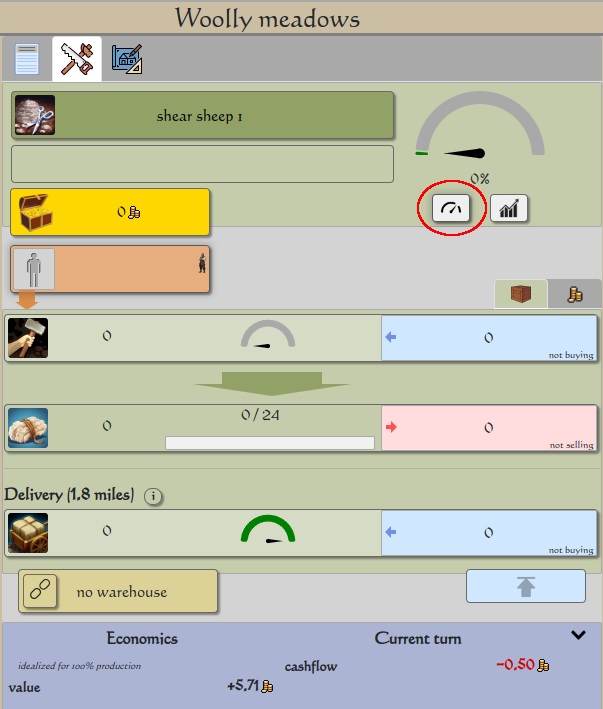
and we will finally put ourselves to work.
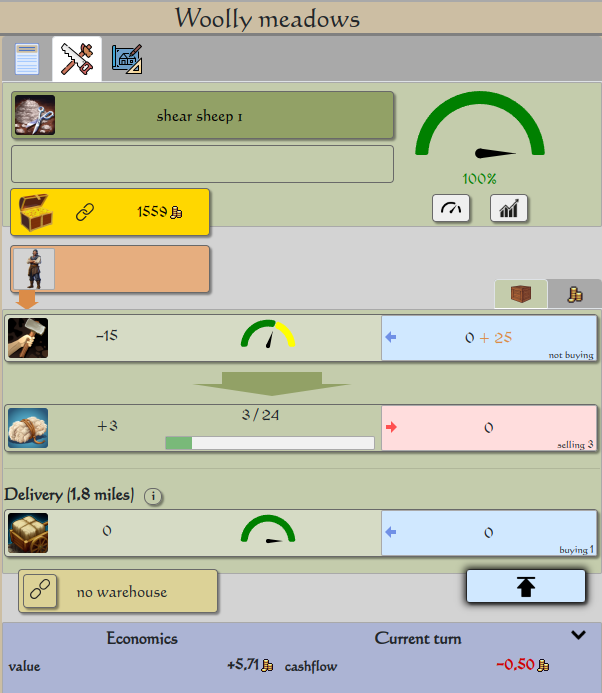
Like construction, production is planned during the turn and takes effect at the end of turn. Unlike construction, there's no way to rush the production. At the end of the turn 3 units of wool is produced, and we have an order to sell all 3 units at the start-of-turn auction of the following turn. For deep and stable markets that's all there is to it. If the market is more volatile, you may want to click in and adjust things like the minimum selling price for wool. The pasture has storage capacity for 24 units and by linking with the storehouse you can allocate more storage space if you don't want to sell at the current price or perhaps want to use the wool yourself as an input to your next production method.
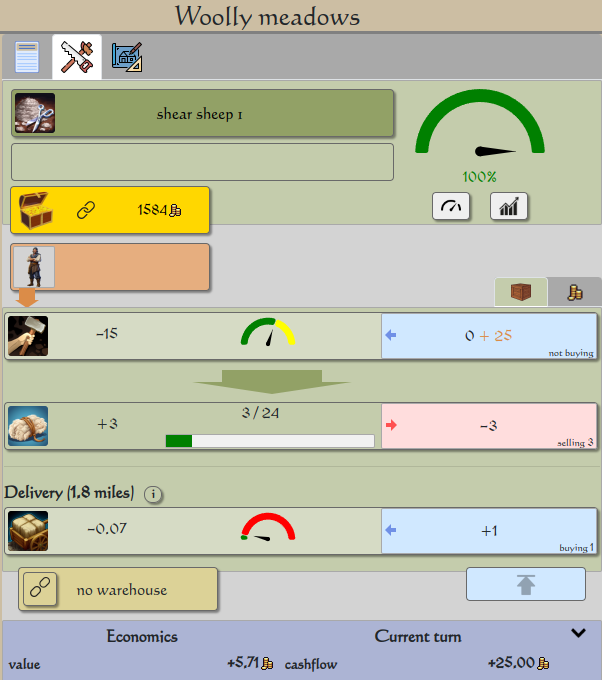 Next turn we see the result. Wool was produced and sold, and we have established a cashflow.
Next turn we see the result. Wool was produced and sold, and we have established a cashflow.
We can now sit back and let the cash flow in. Or, better, think about our next step. Should we expand the pasture to scale up the current production, add that toolshed and upgrade to the more efficient production method, vertically integrate and spin the wool into yarn, or something else entirely.
Before that though, why are those dials showing yellow and red, and why is value lower than the cashflow?
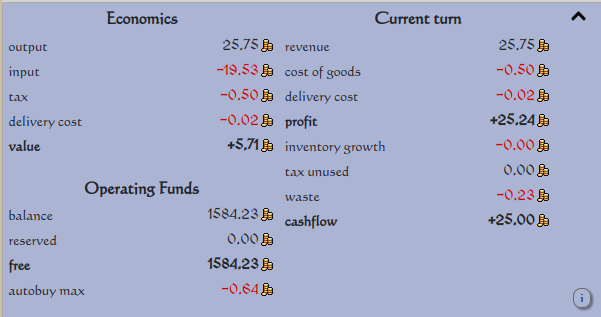
The economics are concerned with the theoretical value of our production method in the prevailing market situation. If we were to rely on purchased labour, we would have to include the input in the cost of goods (which currently only includes the land tax). If we scale up production or need our worker for something else, we should expect our profit to get more similar to value.
We also have a bit of waste, and the most meaningful waste is not even priced, the 10 workdays we're not utilizing. The rest is the expiring carting service. Scaling up our operation would enable us to utilize more of this, or we can link the pasture with the warehouse, allowing us to share labour and carting across multiple buildings. But let's not let this detract from our achievement of positive cashflow! We are in a good position to continue our growth and optimizing away any wastage.
Bonus: Why not aim higher?
By filtering our all but the simple production methods we're foregoing some potentially very lucrative production.
 Crafting belts is a basic production method available to us from the start, with both profit and profit margin being better than shear sheep.
Crafting belts is a basic production method available to us from the start, with both profit and profit margin being better than shear sheep.
There are a lot of products and a lot of production methods in Mercatorio. As supply, demand and prices move around, sometimes violently, there can be enormous profits to be reaped by those well positioned for it. If you spot one of these opportunities early on, you should definitely go for it, but do your due diligence first!
This involves ensuring that you can 1) obtain and afford the construction materials for the building (which can be driven up in price simply by your construction increasing overall demand), 2) obtain inputs and sell outputs at the volumes you're planning without adversely affecting those prices.
 The market for belts in Bordefort is very thin. We would struggle to find buyers and obtain good prices for 40 additional belts per turn. In the worst case we'd tie up a large amount of our funds in a building and an inventory of belts that we're unable to sell.
The market for belts in Bordefort is very thin. We would struggle to find buyers and obtain good prices for 40 additional belts per turn. In the worst case we'd tie up a large amount of our funds in a building and an inventory of belts that we're unable to sell.
As your business and financial muscles grow, these obstacles won't hold you back. Your shipping network can distribute goods across multiple towns, reducing the price impact in each one, your sewing shops may finally get the belts they seek for more efficient garment production (which seen alone would also suffer from a thin belt market, but looking at it from the consumer's side), or you might find a business partner somewhere who is in this situation. At the very beginning however, you might not be able to recover from an expensive wrong move, so plan conservatively and seek less risk when possible.


Great video game, congratulations, keep it up!
This comment is currently awaiting admin approval, join now to view.